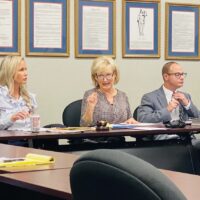Hopkinsville city government awarded 202 small business stimulus grants worth a combined $309,000, but others that might have qualified for help because of COVID-l9 losses left a pile of money on the table.
At Tuesday’s meeting of Hopkinsville City Council, Chief Financial Officer Robert Martin outlined the program that City Comptroller Melissa Clayton managed.
Martin said 76 sole proprietors received $750 each, and 126 businesses that submit payroll tax withholdings to the city received $2,000 each.
City council last year set aside $335,969 from Hopkinsville’s $2.23 million in CARES Act funding to help local small businesses.
Mayor Wendell Lynch said he was surprised there was money remaining — almost $27,000 — when the grant period ended. Officials had assumed the money would go fast and stressed the grants would be awarded on a first-come, first-serve basis when the city started taking applications in October.
For now, the remaining money sits in an economic development account that the city council can decide how to spend later, the mayor said.
Councilman Tom Johnson suggested the council could award an additional $250 to each of the 76 sole proprietors that received grants in the first round.
In addition to the unclaimed money, another surprise came out of the city’s small business grant program. Martin said 75 applications were denied because applicants did not meet the requirements of the grant program. This included 43 applications from entities that don’t have a current city business license.
City Administrative Officer Troy Body said the mayor’s staff is looking into that issue.
“For those businesses that are operating without business licenses, we wanted the council to know we are working on that,” Body said. He added it will be addressed at a meeting expected within the next few months.
Lynch added, “Good news and sometimes not-so-good news comes out of processes like these, and we have identified the need to close the kind of loophole that we probably needed to close before now.”
Jennifer P. Brown is co-founder, publisher and editor of Hoptown Chronicle. You can reach her at editor@hoptownchronicle.org. She spent 30 years as a reporter and editor at the Kentucky New Era. She is a co-chair of the national advisory board to the Institute for Rural Journalism and Community Issues, governing board president for the Kentucky Historical Society, and co-founder of the Kentucky Open Government Coalition.





